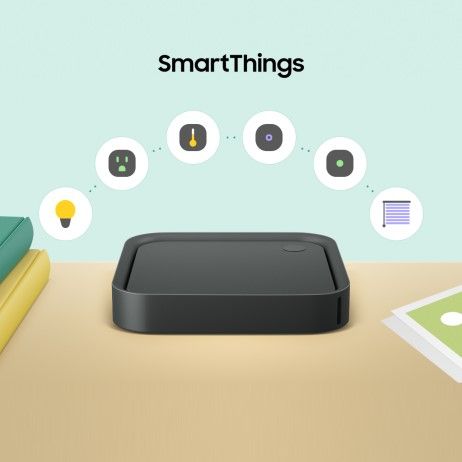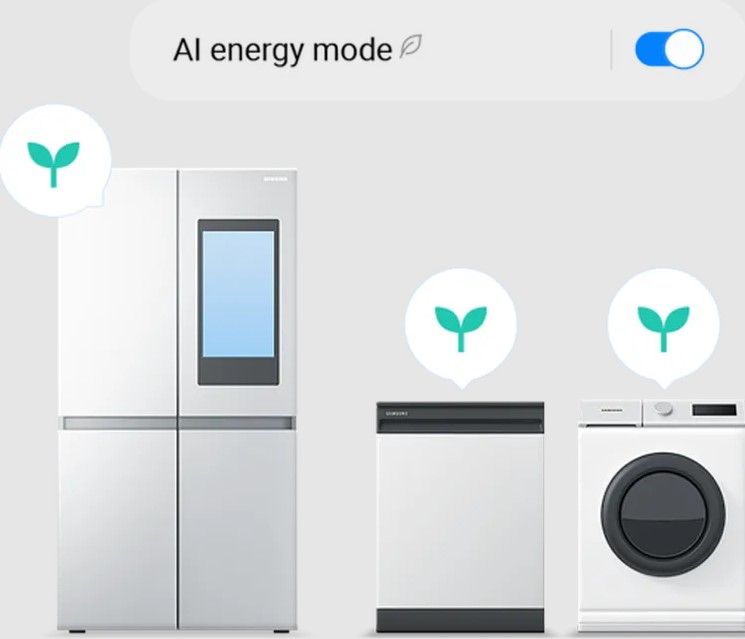
Major SmartThings Update Brings Appliance and Robot Vacuum Support Through Matter
Samsung is leading the way in Matter adoption by adding full support for Matter 1.2, ahead of Amazon, Apple, and Google. However, Samsung’s appliances still don’t work with the new smart home standard.
Samsung SmartThings is set to become the first major smart home platform to fully support Matter 1.2. According to an official statement, the SmartThings platform now works with Matter 1.2, allowing manufacturers and developers to start integrating their compatible devices with the platform. The SmartThings app will be updated to support Matter later this summer, so you won’t be able to control your Matter-compatible Roborock robot vacuum or Midea dishwasher through SmartThings until then.
Samsung also announced several other updates to its smart home platform, including app design improvements, new device control options, a hub backup feature, shareable routines, and the gamification of its SmartThings Energy feature.
Expanded Support and New Features
Support for Matter 1.2 in SmartThings means the appliances added to the new smart home standard — developed jointly by Apple, Amazon, Google, Samsung, and others — will now work with Samsung’s smart home platform. This includes refrigerators, room air conditioners, dishwashers, washing machines, robot vacuums, smoke and carbon monoxide detectors, air quality sensors, air purifiers, and fans. You’ll be able to add these devices directly to the SmartThings app via Matter, control them, and receive notifications and alerts through the app.
The SmartThings platform already supports many of these appliances, both its own Samsung brand and those from other manufacturers, including Thermador, Bosch, and Dacor. However, these are generally supported through cloud integrations.
Matter will bring these integrations local, which should mean faster response times and the ability to control devices even if your internet is down. While Samsung’s connected appliances work with the SmartThings app, they are not Matter certified. This means they only work with the SmartThings app, whereas Matter appliances can work with any smart home platform that supports Matter.
Industry-Wide Matter Support
The other major platforms, Amazon Alexa, Google Home, and Apple Home, have yet to add support for Matter 1.2. Apple announced it will support robot vacuums later this year, but there’s no word on other device types. Home Assistant supports Matter 1.2, but its Matter integration is still in beta. While Matter 1.3 was announced in May, bringing support for energy management, microwave ovens, ovens, electric cooktops, extractor hoods, and electric dryers, it’s unclear when we’ll see widespread platform support.

There are currently only a handful of Matter-certified appliances in the newly supported categories — Roborock’s S8 MaxV Ultra, Ecovac’s Deebot X2 Combo robot vacuums, and AiDot’s air purifier being some examples. But now that one of the major platforms has announced support, we can expect to see more manufacturers enabling it in their appliances. Whirlpool (which owns KitchenAid and Maytag), Midea, LG, and Haier (which owns GE Appliances) are notable brands that have stated their products will support Matter.
Additional Enhancements
Samsung announced a few other enhancements for its platform besides the Matter update. It’s adding a new Hub Manager interface in the SmartThings app to provide a single place to manage multiple hubs. This adds the option to choose a primary hub as well as a new Hub Backup feature. If you have multiple SmartThings hubs, a secondary hub can take over if the primary hub fails.
SmartThings has expanded its hub infrastructure significantly in recent years, adding SmartThings hubs into its TVs, soundbars, and smart refrigerators. With the Hub Backup feature, since it’s more likely you have multiple hubs in your house, if one gets unplugged, fails, or you replace it, your smart home will continue to operate. Most of Samsung’s newer SmartThings hubs support Thread, Zigbee, and Matter, but only the Aeotec SmartThings hub also supports Z-Wave.
Samsung Galaxy smartphone users are getting a new quick access Device Control feature. You’ll now be able to choose devices to add to your home control page on the phone’s quick panel for fast access to adjust the TV’s volume or change a light’s brightness without opening the SmartThings app.
Energy Management and Gamification
Energy management is a key feature of the smart home, and SmartThings Energy, Samsung’s energy management service, is one of the more robust options. Now, Samsung is adding a gamification feature to the platform, which lets you view and manage energy use from compatible appliances to help you save energy. When you use Samsung’s AI Energy Mode, which automatically adjusts appliances’ energy use, you can earn an Energy Stamp for every day you save 400Wh of electricity. These can be converted into Samsung Rewards and spent on Samsung products at Samsung.com.
The SmartThings app is also receiving some interface updates. The Devices tab will now display Rooms as top-level tabs, making it easier to manage your devices by room. Searching for devices has also been enhanced to help you find what you need quicker. Devices will also feature more glanceable information on their card, including the device’s status — for example, a door lock will indicate if it’s locked or unlocked.
You’ll also now be able to share any routines or automation you create in the app with friends and family. Shareable Routines will let you generate a QR code of a routine you’ve created for someone to scan to activate in the SmartThings app.
While these are mostly incremental improvements to the platform, they are welcome updates that — if they work as advertised — will make using SmartThings to manage your smart home easier and more reliable. The platform has also been leading the way in Matter adoption, and while Matter is still far from the smooth, seamless smart home experience we’ve been promised, SmartThings now offers one of the most robust implementations.
Further Improvements and Future Expectations
In addition to the mentioned updates, Samsung is continuously working on enhancing the SmartThings platform to provide a more integrated and user-friendly experience. The introduction of new features and support for a wider range of devices is part of Samsung’s strategy to stay ahead in the smart home market.
SmartThings’ integration with Matter 1.2 is a significant step forward, but it also raises expectations for future updates. Users are anticipating support for even more devices and more seamless integration across different platforms. The promise of faster response times and local control is particularly appealing to users who have experienced delays or connectivity issues with cloud-based integrations.

Moreover, the focus on energy management and sustainability is in line with global trends towards more eco-friendly living. The gamification of energy savings not only encourages users to be more conscious of their energy consumption but also provides tangible rewards that enhance the user experience.
As Samsung continues to roll out these updates, it’s clear that the company is committed to providing a comprehensive smart home solution that caters to the needs of modern consumers. The combination of advanced features, robust support for a wide range of devices, and a focus on user experience positions SmartThings as a leading platform in the smart home industry.
Community and Developer Engagement
Samsung’s approach to community and developer engagement is another critical aspect of its strategy. By providing developers with the tools and support they need to integrate their devices with the SmartThings platform, Samsung is fostering a vibrant ecosystem of compatible products. This not only benefits users by offering them more choices but also drives innovation within the smart home market.
The introduction of Matter 1.2 support is a testament to Samsung’s commitment to open standards and interoperability. By working with other major players in the industry, Samsung is helping to create a more unified and user-friendly smart home experience. This collaborative approach is essential for the continued growth and success of the smart home industry.
Conclusion
Samsung’s latest updates to the SmartThings platform, including full support for Matter 1.2 and various new features, represent a significant advancement in the smart home market. These updates are designed to enhance the user experience, provide faster and more reliable control of devices, and promote sustainable living through advanced energy management features. As Samsung continues to innovate and expand its smart home offerings, SmartThings is well-positioned to remain a leading platform in the industry.








By Andrej Kovacevic
Updated on 18th July 2024